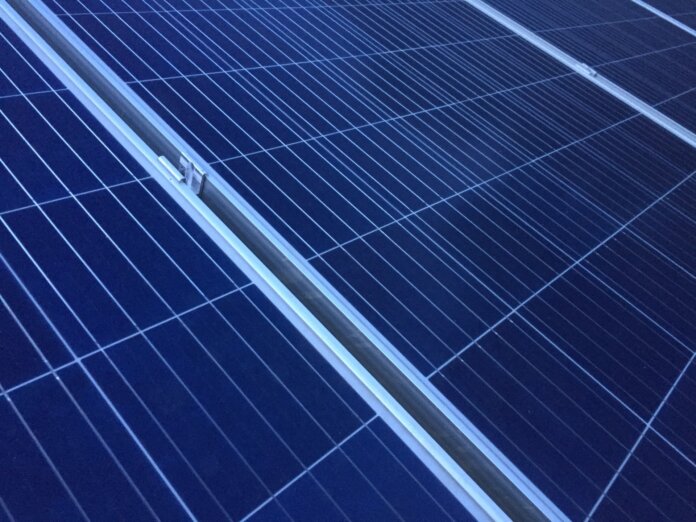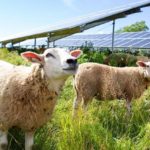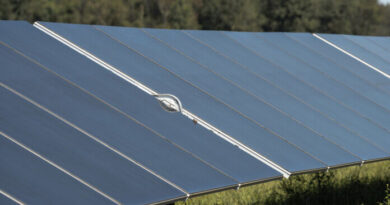DOE Gets Behind Agrivoltaics
The U.S. Department of Energy (DOE) is awarding $8 million for six solar energy research projects across six states and the District of Columbia that will provide new economic opportunities for farmers, rural communities and the solar industry.
The funding supports agrivoltaics – the co-location of agricultural production and solar energy generation on the same land – and aims to reduce barriers to utility-and community-scale solar energy deployment while maximizing benefits for farmers and local communities.
“DOE’s research into agrivoltaics provides an incredible opportunity to pair solar energy generation with safe and robust crop production – ensuring rural communities reap the full economic benefits of a clean energy future,” states U.S. Secretary of Energy Jennifer M. Granholm. “With these exciting projects, we’re supporting sustainable agriculture and investing in the technologies that enable us to make our climate goals a reality – a win-win for our planet and hardworking farmers coast to coast.”
Agrivoltaics is defined as crop production, livestock grazing and/or pollinator habitat under solar panels or between rows of solar panels. In the United States, less than 2% of solar energy projects are co-located with crops or pollinator habitats. In a recent report, researchers at DOE’s National Renewable Energy Laboratory highlighted the ecological and agricultural benefits that could result from improving agrivoltaic practices.
The Foundational Agrivoltaic Research for Megawatt Scale (FARMS) funding program seeks to develop replicable models for agrivoltaics that can provide new economic opportunities while potentially reducing land-use conflicts. DOE is focused on making agrivoltaic practices across the country easier to adopt, lowering the cost and maximizing benefits for farmers, rural communities and the solar industry.
The projects selected for FARMS build on ongoing DOE-funded research, which is focused on conducting research, analysis and dissemination of agrivoltaics best practices. The six projects will examine multiple configurations of solar system design, crops and cultivation methods, and soil and environmental conditions. Researchers will work with agricultural extensions and develop resources to spread the best practices to farmers and communities.
The Iowa State University (Ames, Iowa) project was awarded $1.6 million to study horticulture and beekeeping at solar sites, produce decision support tools, and provide agrivoltaics training programs for farmers and other stakeholders.
Rutgers University (Piscataway, N.J.) is receiving $1.6 million to conduct crop and grazing trials at two solar array testbeds, study community perceptions of agrivoltaics, and create a regional agrivoltaics network for agricultural extension staff in the Northeast, beginning with their partnership with Delaware State University, a historically black land-grant university.
The Solar and Storage Industries Institute (Washington, D.C.) project team will partner with the agriculture and utility sectors to identify barriers to implementing agrivoltaics and produce case studies and guides for solar developers, farmers, and decision-makers. They are receiving $500,000.
The Ohio State University (Columbus, Ohio) project is awarded $1.8 million to conduct grazing and forage (hay) production trials using precision agriculture technologies and study the impacts on soil health at an operating utility-scale solar site.
University of Alaska Fairbanks (Fairbanks, Alaska), with a $1.3 million award, will research agrivoltaics specifically adapted to the food and energy needs of high-latitude underserved communities.
University of Arizona’s (Tucson, Ariz.) research will pilot grazing and climate-smart agriculture under a traditional utility-scale solar site to maximize energy, food and water benefits in the arid Southwest with an award amount $1.2 million.
By selecting awardees with large extension networks, DOE aims to enable more collaboration among farmers, rural communities and the solar industry. The six projects will conduct robust outreach to and engage with regional rural and farming communities, including Hispanic, Tribal and immigrant farmers. These investments will advance diversity, equity and inclusion – supporting President Biden’s Justice40 Initiative to ensure that the clean energy economy benefits all Americans, especially those in underserved and underrepresented communities.
Image: Jadon Kelly on Unsplash
Original Source: https://solarindustrymag.com/doe-awards-8-million-for-projects-focused-on-agrivoltaic-research



















